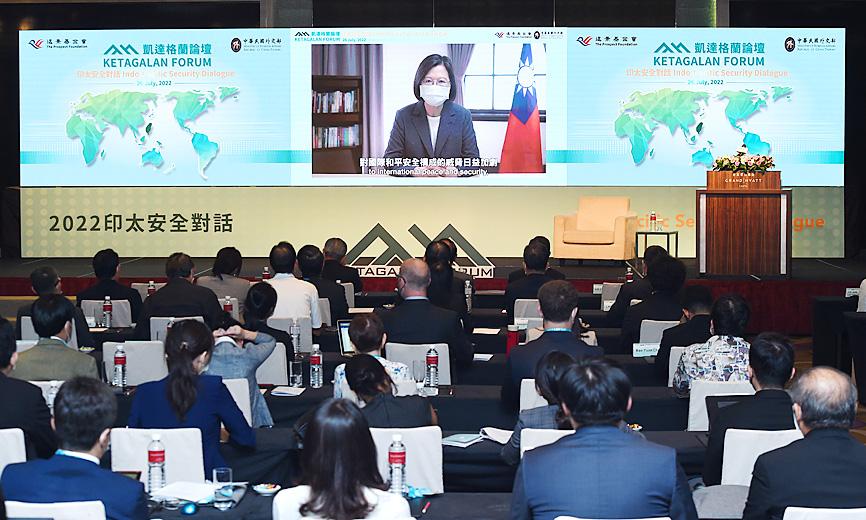Russia’s invasion of Ukraine has affected the timing and strategy of Chinese President Xi Jinping’s (習近平) plan to take Taiwan by force, former US secretary of defense Jim Mattis told a forum in Taipei yesterday, where experts from around the world stressed the importance of like-minded democracies standing together in the face of rising authoritarianism.
Mattis and other security experts were invited to speak either in-person or virtually at the Ketagalan Forum to discuss the impact of the Russia-Ukraine war on the Indo-Pacific region.
Xi and Russian President Vladimir Putin spoke at length about teamwork and partnership before the invasion, but Xi is shocked at what has happened since, including the Russian military’s “pathetic” performance, Mattis said.
The Russia-Ukraine war “is not going to directly influence what Xi has in mind in taking Taiwan by force. I think it will impact him severely about how and when to take such a step,” he told the panel. “But in terms of our response now, I would say in three words: allies, allies, allies.”
While the war has facilitated unity among Western countries, Mattis said that there remain many unanswered questions about how to face uncertainties, including a chilling winter in Europe, an increasingly bellicose Russia and China continuing to amplify Russian talking points.
Jayadeva Ranade, president of the Center for China Analysis and Strategy in India, said that the response from the Indo-Pacific region to the war is premature, as the conflict persists.
“What Putin has set in motion ... is an attempt to change the existing global order, which is backed fully by Xi,” Ranade said.
The joint statement issued after a meeting between Xi and Putin on Feb. 4 states that the two countries “fully support each other’s core interests in exposing external forces interfering in internal affairs of the two countries,” he said, adding that it shows they are justifying Russia’s war, as well as Chinese responses to Taiwan and other countries.
However, Xi is keenly aware of how the Russian invasion affects China’s internal politics, with some in the Chinese Communist Party (CCP) favoring severing ties with Russia and others advocating an alliance, he said.
“There is a fear among the core leadership in the CCP that they may cross the red line as far as the West is concerned, and the US and the West may hit them with sanctions,” he said.
Xi is also concerned about the progress of the war itself, Ranade said.
China’s “philosophy is a quick and short action and the victory at the end,” he said. “They are not seeing it coming to pass in Ukraine, and that has unnerved them.”
A recent statement by NATO about China being a strategic competitor has the Chinese leadership worried about the future and designs of the West, he said.
Unlike Russia, China is far more interconnected with the global financial system, and Chinese are feeling more isolated as the country is losing friends, he said.
An upcoming telephone call between Xi and US President Joe Biden is not likely to sway China’s foreign policy, certainly not in public, Ranade said, adding that Xi has not shown any sign of change.
“The point is that he cannot afford to lose face at this time. If he is pushed to a corner, he will be forced to make a choice and may end up facing the eye of the Chinese people, which have been hyped by him unto ultranationalism,” he said.
Former Australian minister of defense Kevin Andrews said that democratic countries cannot rely on appeasement if they wish to uphold global peace.
China must recognize that any attempt to invade Taiwan would be opposed by allied military forces, Andrews said.
In addition to establishing a clear strategy, Australia and Taiwan must share intelligence and engage in joint military exercises to encourage interoperability, he added.
This does not mean that democratic countries want a fight, but rather demonstrate that they are ready to uphold peace by force if necessary, Andrews said.
Speaking virtually, former US secretary of homeland security Janet Napolitano agreed that international partnership is needed to address rising cyberthreats in the Asia-Pacific region.
Countries have faced “unique challenges” in the cyberarena, including the need to keep up with technological developments, Napolitano said.
At the same time, there is no international framework that “defines lanes in the road for how a cyberattack is treated in warfare or law,” she added.
Napolitano said international partnerships based on mutual understanding, respect and trust are “the real answer” to security risks in the region.
President Tsai Ing-wen (蔡英文) said at the opening of the forum that Russia’s invasion showed that authoritarian regimes would not hesitate to violate the sovereignty of other states.
“These regimes pose increasing threats to international peace and security, requiring us to adopt a coordinated response,” Tsai said. “With decades of experience, Taiwan can play a key role in alliances to counter authoritarian intrusion.”
Additional reporting by Yang Cheng-yu and CNA
Source: Taipei Times - 2022/07/27





















